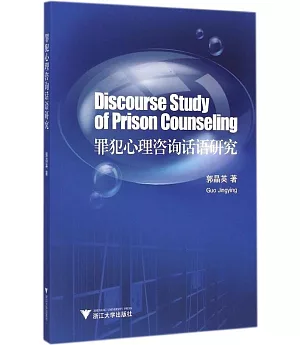內容簡介
重點分析罪犯心理咨詢過程中民警咨詢師和罪犯求詢者采用了哪些話語手段來證明話語的有效性、進行責任歸咎與推卸、協調與他們各自有切身關系的利益。還從比較視角分析干警罪犯個別談話的特殊互動圖景,以客觀全面評價中國罪犯心理咨詢在教育改造方面的功用。
目錄
1 Introduction
1.1 Background to the study
1.1.1 Prisons in slave society
1.1.2 Prisons in feudal society
1.1.3 Prisons after Opium War
1.1.4 Prison after the founding of the People’’s Republic of China
1.2 Research motives
1.3 Research objectives
1.4 Overview chapters breakdown
1.5 Key concepts
2 Prison Counseling: Developments and Reflections
2.1 What is prison counseling
2.1.1 The definition of prison counseling
2.1.2 Prison counseling: historical development
2.1.3 Prison counseling: forms and features
2.1.4 Prison counselors: qualifications and roles
2.1.5 Prison counseling: goals and conflicts
2.2 Literature review
2.2.1 Prison counseling studies
2.2.2 Prison discourse studies
2.3 Summary
3 Methodologies
3.1 Theoretical framework
3.1.1 By saying X, the speaker is doing Y,
but also doing Y1, Y2, Y3...
3.1.2 Saying X and doing Y are determined by the context
3.1.3 Both speakers 1 and 2 are playing a discipline game
3.1.4 Saying X and how X is said are discourse evidence
3.2 Methods
3.2.1 Discursive psychology
3.2.2 Cultural approach to discourse
3.3 Discursive analytic model of prison counseling
3.4 Research questions
3.5 Collection of data
3.5.1 Types of data
3.5.2 Participants
3.5.3 Size of data
3.5.4 Transcription of data
3.6 Limitations
3.6.1 Gender differences
3.6.2 Ethical issues
3.6.3 Other than words
3.6.4 Size of sample
Opening Prison Counseling
4. ] Your secrets are safe with me
4.1. ] Counseling is a talk based on voluntary participation
4.1.2 Counseling is a talk based on confidentiality
4.1.3 Counseling is a talk based on equality
4.1.4 Counseling is a talk based on self-help
4.2 Counseling claimed vs. counseling clone
4.2.1 Whether greeting is necessary is decided only by the police counselors
4.2.2 Criminal history might be enquired into no matter whether
you like it or not
4.3 One-way lecturing or two-way interaction
5 Talking Troubles 1--Problem Presentation
5.1 My problems are worthy of your attention
5.1.1 I might not be good at expressing
5.1.2 Do you believe in fairness and justice
5.1.3 I am not used to seeing it
5.1.4 I feel living is meaningless
5.2 X is y, and y is beyond my ability
Talking Troubles II--Problem Negotiation
6.1 Who is responsible
6.1.1 What have you done
6.1.2 What you can change is only yourself
6.1.3 The prison is no exception
6.1.4 What if you couldn’’t realize your plan
6.1.5 You should see it from a different viewpoint
6.2 Deviant cases
6.3 You should do zl, and if doing zl is not possible, do z2
6.3.1 The police counselors’’ reformulations at work
6.3.2 The police counselors’’ questions at work
7 Closing Prison Counseling
7.1 Orienting to the closing
7.2 Deviant cases
7.2.1 You go ahead with your business
7.2.2 I will not get myself into troubles
7.3 Ending smoothly vs. ending problematically
8 Individual Talk
8.1 What is individual talk
8.2 The process of individual talk
8.2.1 The opening and the closing
8.2.2 To what ends
8.3 Two-way talking or one-way precaution-taking
8.3.1 Topic control
8.3.2 Tag questions
8.3.3 Role attribution
9 Dialogue between Prison Counseling and Individual Talk
9.1 Features that are culturally specific
9.1.1 Highly goal-targeted
9.1.2 Implicitly discipline-constrained
9.1.3 Harmony-oriented
9.2 What makes prison counseling different from individual talk
9.2.1 Topic control
9.2.2 Responsibility negotiating or placing
9.2.3 Indirectness at play
10 Conclusion
10.1 Prison counseling: the ideal and reality
10.1.1 Prison counseling as a complaint box
10.1.2 Prison counseling as an old wine bottle
10.2 Implications for future prison counseling
10.2.1 Implications for prison counseling research
10.2.2 Implications for intervention at the decision-level
10.2.3 Implications for training and practice of prison counseling
10.3 Implications for future prison study
10.3.1 Discourse study of prison
10.3.2 Discourse evidence: a qualitative evaluation method
in prison studies
10.3.3 Discourse study of the image of China
10.3.4 Discourse study of counseling
Appendix Transcription Symbols
Tables
Abbreviations
Keywords Indexes
References
1.1 Background to the study
1.1.1 Prisons in slave society
1.1.2 Prisons in feudal society
1.1.3 Prisons after Opium War
1.1.4 Prison after the founding of the People’’s Republic of China
1.2 Research motives
1.3 Research objectives
1.4 Overview chapters breakdown
1.5 Key concepts
2 Prison Counseling: Developments and Reflections
2.1 What is prison counseling
2.1.1 The definition of prison counseling
2.1.2 Prison counseling: historical development
2.1.3 Prison counseling: forms and features
2.1.4 Prison counselors: qualifications and roles
2.1.5 Prison counseling: goals and conflicts
2.2 Literature review
2.2.1 Prison counseling studies
2.2.2 Prison discourse studies
2.3 Summary
3 Methodologies
3.1 Theoretical framework
3.1.1 By saying X, the speaker is doing Y,
but also doing Y1, Y2, Y3...
3.1.2 Saying X and doing Y are determined by the context
3.1.3 Both speakers 1 and 2 are playing a discipline game
3.1.4 Saying X and how X is said are discourse evidence
3.2 Methods
3.2.1 Discursive psychology
3.2.2 Cultural approach to discourse
3.3 Discursive analytic model of prison counseling
3.4 Research questions
3.5 Collection of data
3.5.1 Types of data
3.5.2 Participants
3.5.3 Size of data
3.5.4 Transcription of data
3.6 Limitations
3.6.1 Gender differences
3.6.2 Ethical issues
3.6.3 Other than words
3.6.4 Size of sample
Opening Prison Counseling
4. ] Your secrets are safe with me
4.1. ] Counseling is a talk based on voluntary participation
4.1.2 Counseling is a talk based on confidentiality
4.1.3 Counseling is a talk based on equality
4.1.4 Counseling is a talk based on self-help
4.2 Counseling claimed vs. counseling clone
4.2.1 Whether greeting is necessary is decided only by the police counselors
4.2.2 Criminal history might be enquired into no matter whether
you like it or not
4.3 One-way lecturing or two-way interaction
5 Talking Troubles 1--Problem Presentation
5.1 My problems are worthy of your attention
5.1.1 I might not be good at expressing
5.1.2 Do you believe in fairness and justice
5.1.3 I am not used to seeing it
5.1.4 I feel living is meaningless
5.2 X is y, and y is beyond my ability
Talking Troubles II--Problem Negotiation
6.1 Who is responsible
6.1.1 What have you done
6.1.2 What you can change is only yourself
6.1.3 The prison is no exception
6.1.4 What if you couldn’’t realize your plan
6.1.5 You should see it from a different viewpoint
6.2 Deviant cases
6.3 You should do zl, and if doing zl is not possible, do z2
6.3.1 The police counselors’’ reformulations at work
6.3.2 The police counselors’’ questions at work
7 Closing Prison Counseling
7.1 Orienting to the closing
7.2 Deviant cases
7.2.1 You go ahead with your business
7.2.2 I will not get myself into troubles
7.3 Ending smoothly vs. ending problematically
8 Individual Talk
8.1 What is individual talk
8.2 The process of individual talk
8.2.1 The opening and the closing
8.2.2 To what ends
8.3 Two-way talking or one-way precaution-taking
8.3.1 Topic control
8.3.2 Tag questions
8.3.3 Role attribution
9 Dialogue between Prison Counseling and Individual Talk
9.1 Features that are culturally specific
9.1.1 Highly goal-targeted
9.1.2 Implicitly discipline-constrained
9.1.3 Harmony-oriented
9.2 What makes prison counseling different from individual talk
9.2.1 Topic control
9.2.2 Responsibility negotiating or placing
9.2.3 Indirectness at play
10 Conclusion
10.1 Prison counseling: the ideal and reality
10.1.1 Prison counseling as a complaint box
10.1.2 Prison counseling as an old wine bottle
10.2 Implications for future prison counseling
10.2.1 Implications for prison counseling research
10.2.2 Implications for intervention at the decision-level
10.2.3 Implications for training and practice of prison counseling
10.3 Implications for future prison study
10.3.1 Discourse study of prison
10.3.2 Discourse evidence: a qualitative evaluation method
in prison studies
10.3.3 Discourse study of the image of China
10.3.4 Discourse study of counseling
Appendix Transcription Symbols
Tables
Abbreviations
Keywords Indexes
References
網路書店
類別
折扣
價格
-
新書87折$251





















